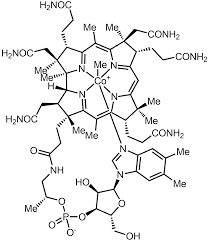
methylcobalamin
Methylcobalamin, a bioactive form of vitamin B12, is critical for a number of bodily functions, including nerve health, red blood cell formation, and DNA synthesis. Unlike other forms of B12, such as cyanocobalamin, methylcobalamin is readily absorbed and utilized by the body, making it a preferred option for supplementation. In this article, we will explore the science behind methylcobalamin, its health benefits, potential uses, and how to incorporate it into your daily routine.
Table of Contents
What is Methylcobalamin?
A Key Form of Vitamin B12
Methylcobalamin is one of the active, bioavailable forms of vitamin B12. Vitamin B12 itself is an essential water-soluble nutrient that plays an integral role in several bodily processes. It is required for nerve cell function, the production of DNA and red blood cells, and overall metabolic health.
The human body cannot produce B12, so it must be obtained through diet (particularly animal-based foods) or supplements. Methylcobalamin is one of the several different forms of B12, including cyanocobalamin and adenosylcobalamin, with the primary distinction being that methylcobalamin is in its active form, which is immediately usable by the body.
Benefits of Methylcobalamin
1. Promotes Nervous System Health
Methylcobalamin is vital for the health of your nervous system. It is directly involved in the synthesis of myelin, a protective sheath that surrounds nerve fibers, ensuring that nerve signals are transmitted efficiently. This makes methylcobalamin particularly valuable for those suffering from conditions like peripheral neuropathy or multiple sclerosis, where nerve damage occurs. Adequate methylcobalamin levels support healthy nerve function and may alleviate symptoms of nerve degeneration.
2. Reduces Risk of Anemia
Vitamin B12, particularly methylcobalamin, is a key player in the production of red blood cells. It helps in the formation of hemoglobin and is involved in the process of cell division, ensuring the body produces healthy, mature red blood cells. A deficiency in B12 can result in megaloblastic anemia, where the body is unable to produce enough healthy red blood cells. Supplementing with methylcobalamin can help prevent or treat this condition, alleviating fatigue, weakness, and other symptoms of anemia.
3. Supports Energy Levels
A deficiency in B12 can leave individuals feeling constantly tired or sluggish. This is because B12 is involved in the metabolism of carbohydrates, fats, and proteins, transforming them into energy. By ensuring that methylcobalamin levels are sufficient, individuals can support their body’s natural energy production, reducing feelings of exhaustion and promoting overall vitality.
4. Enhances Cognitive Function
Methylcobalamin plays a role in maintaining cognitive function, especially in older adults. It supports brain health by reducing levels of homocysteine, an amino acid that can contribute to brain shrinkage and cognitive decline when present in high amounts. Research suggests that methylcobalamin supplementation may be particularly beneficial in slowing the progression of neurodegenerative conditions such as Alzheimer’s and dementia, as well as improving memory and focus in general.
5. DNA Synthesis and Repair
Another critical function of methylcobalamin is its involvement in DNA synthesis and repair. This is essential for healthy cell growth, tissue regeneration, and overall cellular function. Inadequate B12 levels can compromise DNA synthesis, leading to various health problems, including defective cell replication and delayed healing processes.
How to Incorporate Methylcobalamin Into Your Routine
Dietary Sources of Vitamin B12
While methylcobalamin itself isn’t found in food, vitamin B12, in its various forms, can be obtained from a diet rich in animal-based products. Common dietary sources include:
- Beef liver
- Fish (especially salmon, tuna, and trout)
- Eggs
- Dairy products like milk, cheese, and yogurt
For those on plant-based diets, however, vitamin B12 is typically absent, so supplementation becomes necessary. While cyanocobalamin is often the supplement of choice, methylcobalamin is considered more effective because it doesn’t require conversion in the body.
Supplementing with Methylcobalamin
Methylcobalamin supplements are available in various forms, making it easy for people to choose an option that suits their lifestyle:
- Tablets and Capsules: These are the most common forms of supplementation, providing an easy way to add methylcobalamin to your daily routine.
- Sublingual Tablets or Lozenges: These dissolve under the tongue for quicker absorption, ideal for those with digestive issues or concerns about absorption.
- Injections: Administered by a healthcare professional, these are sometimes necessary for individuals with severe deficiencies or absorption issues.
Who Needs Methylcobalamin?
Vegetarians and Vegans
Since methylcobalamin is mainly found in animal products, individuals following vegetarian or vegan diets are at a higher risk of developing B12 deficiencies. As a result, vegans especially should consider supplementing with methylcobalamin to meet their B12 requirements.
People with Digestive Issues
Certain medical conditions, such as celiac disease, Crohn’s disease, or after gastrointestinal surgeries, can affect the body’s ability to absorb B12. Methylcobalamin is one of the most bioavailable forms of the vitamin, making it a great choice for people with malabsorption problems.
Older Adults
As we age, our ability to absorb vitamin B12 from food decreases, which can lead to deficiencies. Older adults may benefit from methylcobalamin supplementation to ensure their levels stay optimal, particularly for maintaining cognitive function and nerve health.
Side Effects and Safety Considerations
Methylcobalamin is generally regarded as safe and well-tolerated. However, some individuals may experience mild side effects such as:
- Mild gastrointestinal discomfort
- Skin rash
- Headaches
These symptoms are rare and typically resolve once the body adjusts to the supplement. High doses of methylcobalamin (e.g., over 1,000 mcg per day) are generally safe, but it is always best to consult a healthcare provider, especially if you are pregnant, breastfeeding, or taking medications that affect B12 metabolism.
Research on Methylcobalamin
Neuropathy and Nerve Regeneration
Recent studies have suggested that methylcobalamin may have a regenerative effect on nerve tissue. It has been particularly noted for its role in treating diabetic neuropathy and other forms of peripheral nerve damage. Methylcobalamin helps in repairing nerve cells and reducing pain or numbness associated with nerve degeneration.
Methylcobalamin and Cognitive Decline
Emerging research shows that methylcobalamin may help slow cognitive decline in conditions like Alzheimer’s disease and age-related dementia. It does so by reducing homocysteine levels, a known risk factor for brain atrophy. Studies are ongoing, but the early findings are promising for methylcobalamin’s potential as a therapeutic aid in these conditions.
Conclusion
Methylcobalamin is a powerful form of vitamin B12 with wide-reaching health benefits, especially when it comes to supporting the nervous system, boosting energy levels, preventing anemia, and maintaining cognitive health. Its superior bioavailability makes it an ideal choice for those with B12 deficiencies or who require higher B12 levels due to age, dietary choices, or medical conditions. Adding methylcobalamin to your daily regimen, whether through diet or supplementation, can significantly contribute to overall well-being.
Consult with a healthcare professional to determine whether methylcobalamin supplementation is right for you, and take advantage of its potential to improve health and vitality.



